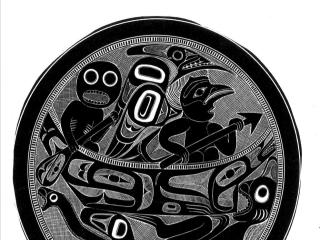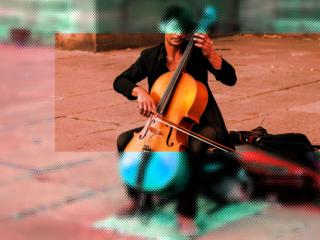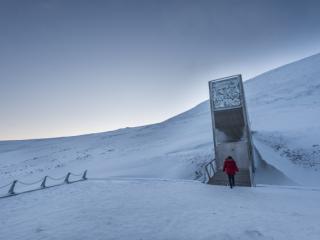The Haida First Nation people in British Columbia have a myth about the origin of humanity coming from "Fungus Man." And that myth contains plenty of truth.More
Interviews By Topic
Ebony Thomas is the author of “The Dark Fantastic: Race and the Imagination from Harry Potter to the Hunger Games.” For her the most important word in that title is "imagination." She believes that without imagination we can't change the world because we can't see it. We can't daydream a better world into existence. It's why she's always identified with another literary daydreamer — Anne of Green Gables.More
A girl, a horse, and a magical sword save a kingdom in Robin McKinley's young adult classic, "The Blue Sword" — a book beloved by women of all ages. "Hild" author Nikola Griffith explains why. More
There’s a book that author Ada Calhoun thinks of as both one of her favorites to read out loud with her son, as well as one that has inspired her own writing. It’s “A Street Through Time: The 12,000 Year Journey Along the Same Street ” — a story of one street, leading the reader through historical events and the passage of time, with the street itself starring as the main character.More
Sara Wachter-Boettcher warns that failing to account for the unintended ways technology shapes our lives can cause us pain that might be avoided if we think about how we design digital platforms and apps differently.More
You know the Apple origin story with the two Steves in the garage. You know the Facebook origin story with Mark Zuckerberg in his dorm. But journalist Claire Evans argues, if you want to tell the internet origin story, you have to talk about women.More
Milwaukee has a reputation as America's "Brew City." But why? Historian Ben Barbera lays out the economic forces and acts of God that built the houses of Miller, Pabst and Schlitz.More
Milwaukee historian John Gurda takes us on a boat ride down the Milwaukee River as we learn how the city nearly lost its river, and what Milwaukee is now doing to preserve it.More
In her book "Citizen: An American Lyric," poet Claudia Rankine challenges readers to explore their underlying assumptions about race. She tells Charles Monroe-Kane what compelled her to write the book, and about visiting Ferguson, Missouri.More
"To the Best of Our Knowledge" producer Shannon Henry Kleiber shares a story about her mother, who was diagnosed with Alzheimer’s disease two years ago, and the power of music.More
After a 40 year career as a psychologist, Francine Toder decided to start playing the cello. The experience convinced her that music – and in fact all the arts – may be the best way to stimulate the brain and improve well-being late in life.More
Anne Basting has found asking people with Alzheimer’s disease or other dementia open-ended queries, rather than pointed yes or no questions that require remembering something specific, can create powerful connections.More
Kamut is arguably the oldest grain in the world. Bob Quinn, who runs the multi-million dollar nonprofit Kamut International, argues that it's an example of what can be right in a very wrong American agricultural world.More
Botanist Robin Wall Kimmerer says there is a reason so many around the world consider corn to be sacred. We give it life, and in return, it gives us life. She says the industrial-scale farming of America has lost control of that balance.More
If a disaster wiped out our ability to grow crops, how would the survivors rebuild civilization? Back in the 1990’s Cary Fowler wondered the same thing. So he created the Svalbard Global Seed Vault – otherwise known as the Doomsday vault.More
For years it was rumored that Thomas Jefferson had a sexual relationship with Sally Hemings. Then legal historian Annette Gordon-Reed proved it. She tells the complicated story of the Jefferson-Hemings relationship.More
Books can take us anywhere, but they can also take us any time. Ruth Ozeki pulls us through time and across an ocean in her novel "A Tale For the Time Being."More
Rev. Alex Gee is fascinated by genealogy. So he took a DNA test and discovered one of his ancestors was a white slave owner. Then he went down to New Orleans to meet his white relatives — and that meeting sparked a slew of complicated emotions.More


















